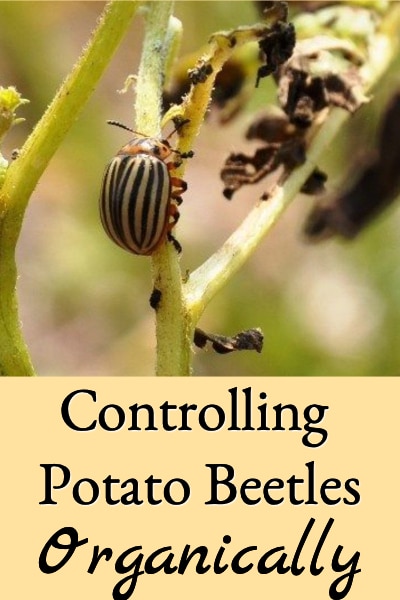
Both the yellow, black-striped adult and the black-spotted, red larvae feed on potato leaves and can completely consume them. This greatly reduces tuber yields and may even kill the plants.
The potato beetle can also be a serious pest on tomato, eggplant, and pepper (all members of the nightshade family).
Steps For Controlling Potato Beetles
Understand The Life Cycle
Adult potato beetles overwinter in the soil and emerge in late spring as temperatures rise. They establish themselves on early or volunteer plants, mate, and the females lay orange-yellow eggs on the underside of the leaves.
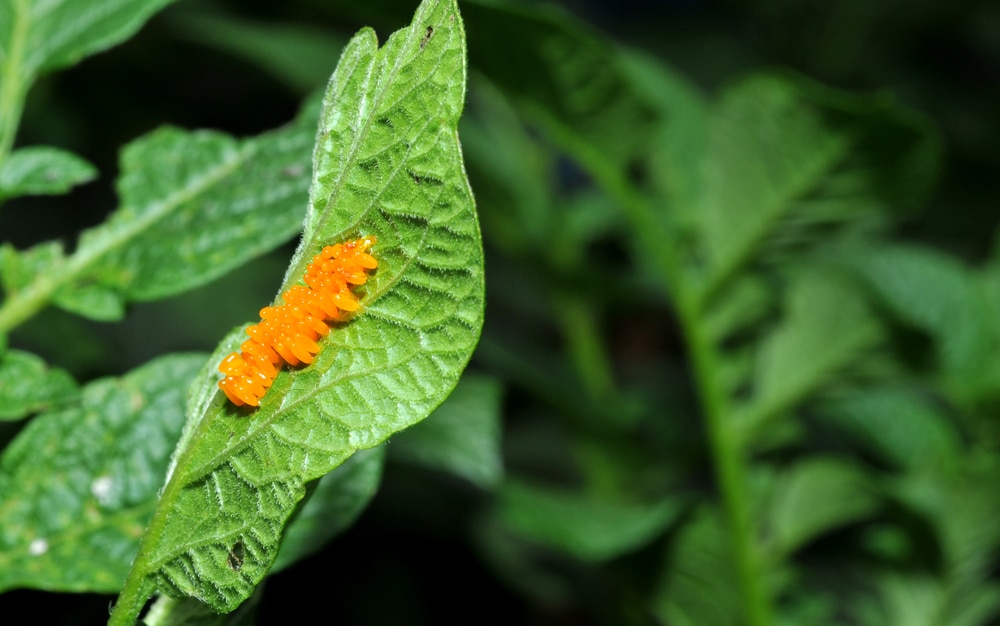
Potato Beetle Eggs
They lay the eggs in bunches of about two dozen but can lay up to 500 eggs over a month. Eggs hatch in approximately a week, and the larvae begin feeding on the potato foliage.
Because they’re laid in bunches, the larvae tend to be found in clumps, and the damage they do can be quick and severe. The larval stage lasts approximately two weeks, and then they burrow in the ground to pupate.
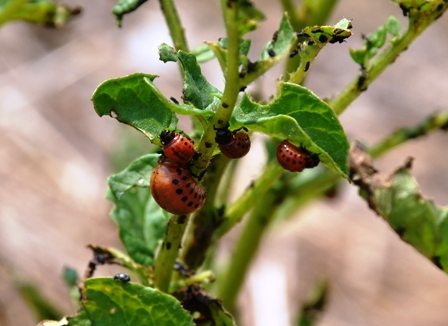
Potato Beetle Larvae
In about another week, the adult beetles emerge, and the process starts all over. Depending on where you live, there are typically two to three generations of beetles per year.
Organic Methods for Controlling Potato Beetles
A variety of strategies are generally necessary to control potato beetles, particularly if organic control is desired:
1) Crop rotation
This is the first and one of the best defenses against potato beetles (see Crop Rotation: A Simple System). By rotating the potato bed every year, the beetles overwintering in the ground (in last year’s potato bed) don’t emerge into this year’s potato bed. Instead, have to go looking for the potatoes.
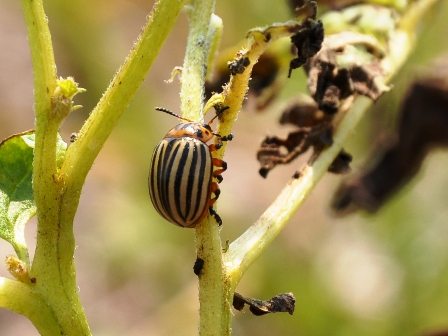
Adult Potato Beetle
This may just delay the first beetle attack on the potatoes. But if you use early maturing potato varieties, it’s sometimes possible to grow and harvest your potatoes before the beetles ever find them.
2) Mulching
Mulching with straw has been shown to reduce the beetle’s ability to locate potato plantings. Also, mulch creates an environment favorable to potato beetle predators. Since we use the “lazy bed” potato method for growing potatoes, we definitely mulch our potatoes.
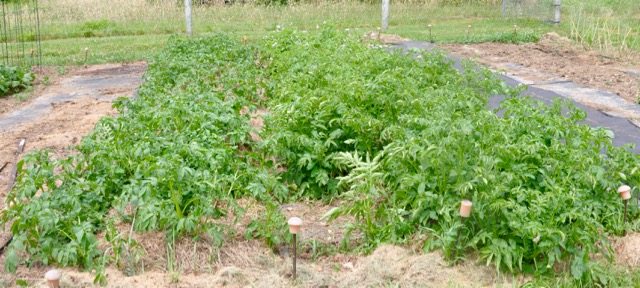
Potatoes Growing Through Mulch
3) Covering the Potatoes
Covering the potatoes with row covers is another method that combined with crop rotation helps prevent the adult beetles from finding the potatoes.
4) Hand Picking
Picking the beetles or larvae off and destroying them is also practical for small potato patches. Since the eggs are laid in clumps, by carefully watching the bottom of the potato leaves for the orange eggs, it’s often possible to destroy the eggs before they hatch and do any damage.
5) Organic Pesticides
Organic substances such as rotenone or Bt can be used for controlling potato beetles. Note, however, rotenone is quite toxic so use it with caution.
Bt is only effective if the beetles ingest it early in the larval stage. Therefore, Bt must be applied when larvae are first seen and repeated frequently to assure later hatching larvae ingest the Bt.
6) Fast Maturing Varieties
Today, commercial growers are using genetically modified potato varieties to thwart potato beetles, but I wouldn’t even consider using them in our garden.
Instead, consider using one of several varieties of potatoes that mature in just 75 – 85 days. Often, these varieties develop tubers before the beetles become serious pests.
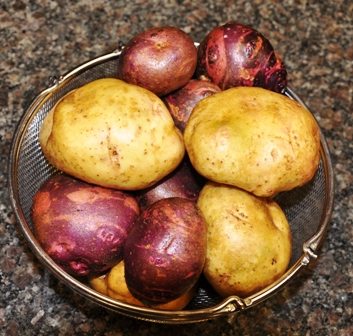
Homegrown Caribe & Yukon Gold Potatoes
These varieties include Norland, Redsen, Sunrise, Superior, Caribe, Pungo, and Yukon Gold. Using one of these short-season varieties is usually a great strategy.
We’ve found that a combination of strict crop rotation, mulching, handpicking and destroying, and using fast-maturing varieties has worked in our garden, and we usually have a nice crop of potatoes each year. We particularly enjoy the Yukon Gold and Caribe potatoes and they’ve been very successful.
Dan Liese says
Where do you buy your tubers for growing your potatoes? Also when do you plant them in the ground?
Lesa says
Hi Dan, I buy my tubers here: https://www.woodprairie.com As far as when, I make a seed starting and planting schedule that I follow: https://www.betterhensandgardens.com/making-2021s-seed-starting-planting-schedule-w-downloadable-template/ Wherever you are, make sure that there’s no chance of frost and that the ground has warmed up to above 50 degrees before planting.
Mandi says
I fought potato beetles all summer last year. I’m pinning this!
Lesa says
Good Luck Mandi! I think the home grown potatoes are much better than store bought, so I’m not letting those beetles have them!